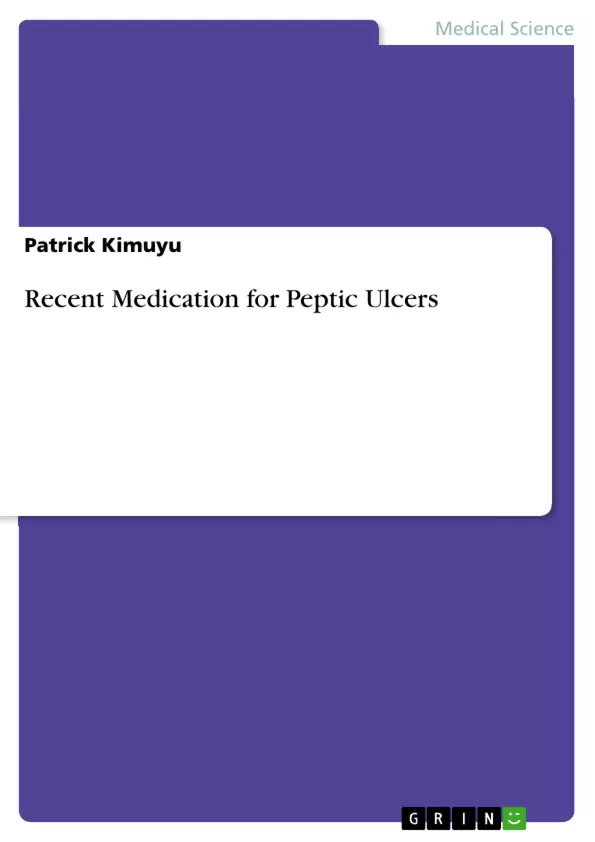Peptic ulcer has become one of the leading gastrointestinal (GIT) disorders. This phenomenon is attributable to the causes of the ulcers, especially Helicobacter pylori (H. pylori) infections which are difficult to treat . They are also caused by acid production from the gastric lining. Therefore, treatment with recent medication depends on the cause of peptic ulcers. Currently, there are different forms of medication used for treating peptic ulcers comprising of antibiotics, acid blockers, antacids, and cytoprotective agents.
This article provides a comprehensive discussion on recent medication for peptic ulcers.
Table of Contents
- Introduction
- Antibiotics
- Clarithromycin
- Indications
- Side effects
- Contraindications
- Amoxicillin
- Indications
- Side effects
- Contraindications
- Clarithromycin
- Medications for Blocking Acid Production
- Omeprazole
- Indications
- Side effects
- Contraindications
- Lansoprazole
- Indications
- Side effects
- Contraindications
- Cimetidine
- Indications
- Side effects
- Contraindications
- Omeprazole
Objectives and Key Themes
This article discusses recent medications used in the treatment of peptic ulcers, providing a comprehensive overview of antibiotics, acid blockers, and other relevant therapies. The focus is on the treatment of peptic ulcers caused by Helicobacter pylori (H. pylori) infection.
- Treatment of Peptic Ulcers
- Antibiotics for H. pylori Eradication
- Acid Blockers and Their Mechanism of Action
- Side Effects and Contraindications of Medications
- Recent Advances in Peptic Ulcer Management
Chapter Summaries
- Introduction: This section introduces the prevalence of peptic ulcers and the role of H. pylori infections and gastric acid production in their development. It highlights the use of different medication categories, including antibiotics, acid blockers, and other agents.
- Antibiotics: This chapter discusses the role of antibiotics in eradicating H. pylori bacteria. It focuses on the triple therapy regimen, which often includes Clarithromycin and Amoxicillin.
- Clarithromycin: This section provides a detailed description of Clarithromycin, its mechanism of action, indications, side effects, and contraindications. It highlights its use in combination with other drugs for treating H. pylori infection.
- Amoxicillin: This chapter discusses Amoxicillin, its formulation, mechanism of action, indications, side effects, and contraindications. It emphasizes its role in combination therapy for H. pylori eradication.
- Medications for Blocking Acid Production: This chapter focuses on the treatment strategies that block acid production in the stomach. It introduces different types of acid blockers, including omeprazole, lansoprazole, and cimetidine.
- Omeprazole: This section provides information on Omeprazole, a proton pump inhibitor. It covers its mechanism of action, indications, side effects, and contraindications.
- Lansoprazole: This chapter discusses Lansoprazole, another proton pump inhibitor. It details its mechanism of action, indications, side effects, and contraindications.
- Cimetidine: This section provides information on Cimetidine, an H2 blocker. It covers its mechanism of action, indications, side effects, and contraindications.
Keywords
Peptic Ulcer, Helicobacter pylori, Antibiotics, Clarithromycin, Amoxicillin, Acid Blockers, Proton Pump Inhibitors, Omeprazole, Lansoprazole, Cimetidine, H2 Blockers, Side Effects, Contraindications, Gastrointestinal Disorders, Treatment Regimens, Recent Medications.
Frequently Asked Questions
What are the main causes of peptic ulcers?
The primary causes are infections with the bacterium Helicobacter pylori (H. pylori) and excessive acid production in the stomach.
Which antibiotics are used for H. pylori?
Commonly used antibiotics include Clarithromycin and Amoxicillin, often prescribed as part of a triple therapy regimen.
How do Proton Pump Inhibitors (PPIs) work?
PPIs like Omeprazole and Lansoprazole block the enzyme in the stomach wall that produces acid, allowing the ulcer to heal.
What is the role of H2 blockers?
H2 blockers like Cimetidine reduce the amount of acid released into the digestive tract, which relieves ulcer pain and promotes healing.
Are there side effects to these medications?
Yes, side effects can range from diarrhea and nausea to more specific contraindications depending on the individual's medical history.
- Arbeit zitieren
- Patrick Kimuyu (Autor:in), 2018, Recent Medication for Peptic Ulcers, München, GRIN Verlag, https://www.hausarbeiten.de/document/388475


